A booming online marketplace is fuelling a dangerous new trend in backyard car repairs - and no one really seems to be watching.
Temu, The Chinese mega-platform which offers countless products for less than the cost of a coffee, is targeting Aussie car owners with bargain-priced tools and vehicle components.
While the site claims to offer value, car makers say the low-cost parts pose “a significant safety risk”.
From brake pad spreaders and panel clamps to unbranded fasteners, even engine components, the app sells an expanding range of vehicle hardware with little to no information on where they were manufactured, whether they’ve been safety tested in Australia, or if they comply with any Australian Design Rules (ADRs) and roadworthiness standards.
In the same way that Chinese car manufacturers have pivoted to Australia after facing regulatory hurdles in Europe, parts suppliers have turned to new markets to offload vehicle components.
Despite the proliferation of parts entering the country, most government agencies approached by News Corp Australia simply passed the buck.
Federal agencies said they were ‘monitoring’ the situation or claimed responsibility for safety standards lay with state departments.
Meanwhile, state departments claim they only uphold standards for new vehicles entering the country while modifcations made after that arrival are the responsibility of owners and mechanics.
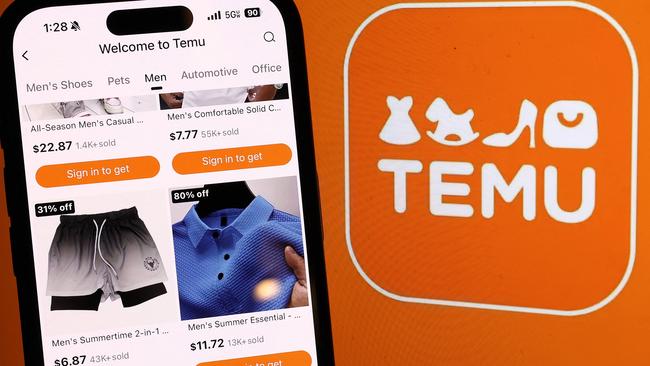
CAR BRANDS LEFT STUNNED BY TEMU’S MOVE
While the buck-passing continues, so too does the flood of parts entering the country, with Temu in particular looking to actively promote their part in the process.
Some products are marketed as “universally applicable” but experts say the parts are often poor quality imitations.
Many parts, such as vehicle cooling systems, are specific to indindividual vehicles and should only be installed by qualified experts.
Installing an unknown component without precise specifications, can lead to system failures, overheating or engine damage.
Several automotive products listed on the site appear to mimic genuine parts from established car manufacturers by copying brand names and genuine part numbers.
For example, a listing titled “For Honda, VTEC Solenoid Car Heat Shield Spool Gasket” seems genuine and made for, or by, Honda on first impression.
It even includes Honda’s manufacturer part number.
MORE:Musk, Tesla smashed by China ‘military’ ban
However, the PDF manual containing basic installation information, fails to offer any clarity on the part’s compatibility or origin.
Further investigation revealed the origin as “Zhejiang, China” with no official affiliation to Honda disclosed.
Zhejiang is known as a manufacturing hub in China, while the area is home to reputable manufacturers, it also has numerous small-scale factories that may not adhere to international quality standards.
On the genuine Honda Parts Connection website, the same part is listed at approximately $268, much higher than the $45 on Temu.
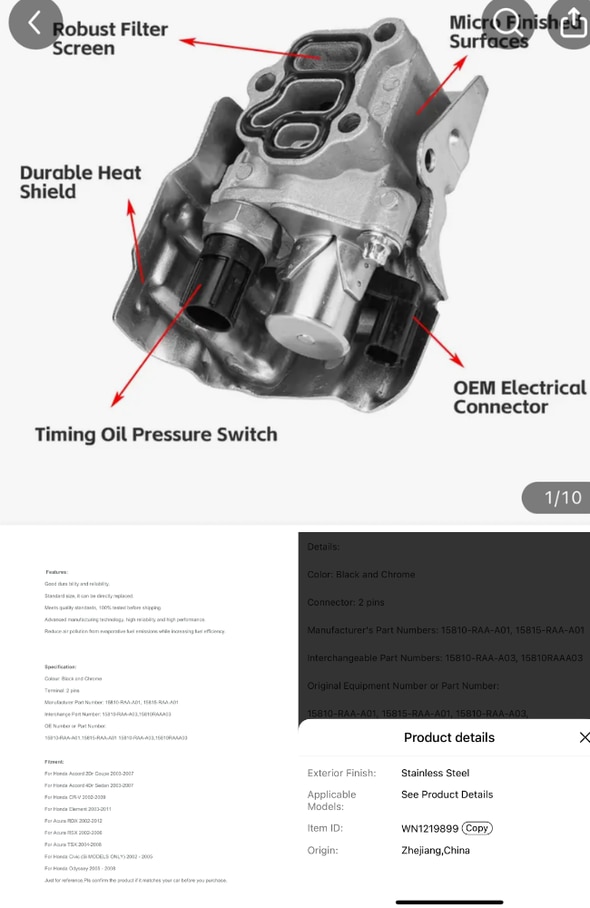
Honda Australia said it could not guarantee that the product advertised is a genuine Honda part.
“While the images depict a Honda part number, Honda Australia cannot confirm the authenticity of a part advertised based on representations from a third party suppler/retailer,” a Honda spokeswoman said.
“To ensure ongoing vehicle reliability and safety, Honda Australia strongly recommends using Genuine parts sourced through a Honda Centre.”
SOCIAL MEDIA FUELLING MARKET FOR CHEAP PARTS
Temu’s expansion into Australia’s automotive parts market has been backed by YouTube and Instagram influencers who receive free products and discount codes in exchange for showcasing installation tutorials to their followers.
In one example, a YouTube creator showcased how he realigned the panels of a heavily damaged Nissan Patrol using a $13 clamp from Temu paired with a winch.
MORE:Rust scandal engulfs China ute importer
“This cost me a grand total of $13 and something cents, and she’s heavy,” he said.
Nissan Australia was shocked by the video.
“Anything structural or panel wise will definitely impact the safety and operation of the vehicle, we already have challenges with imported and counterfeit parts which are not designed for vehicles compliant with ADR rules and our Australian safety ratings. Other parts also can lead to issues, such as something as simple as clamps and hoses not doing the job they are designed to do and causing leaks, pressure loss etc which can lead to extreme safety risks or engine malfunction,” a Nissan spokeswoman said.
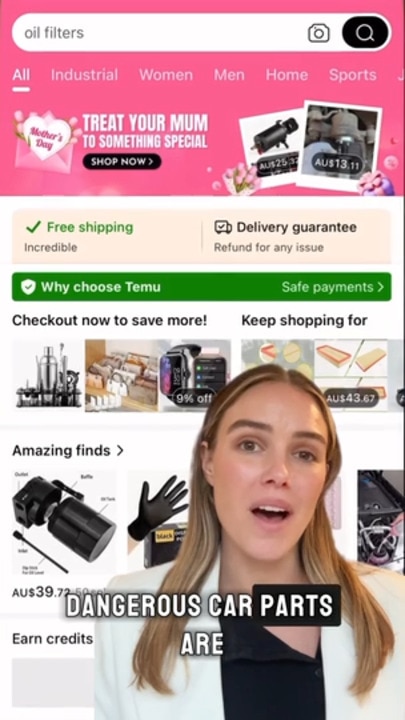
“The use of non-genuine parts, particularly those not engineered and tested to meet Australian safety standards, poses a significant safety risk to both the driver and other road users.”
Another creator, Fink & Co, posted a video “TEMU car parts…we test it out”, showing car enthusiasts unboxing a haul of budget car parts.
The video shows items ranging from jumper cable clamps and wrenches to steering wheels, gear knobs, decals and drill bits.
Others showed the installation of plastic sound-deadening clips and bonnet fasteners for less than $3, a process that, in the hands of a professional, would normally involve OEM parts and proper torque tools.
The parts are even finding their way to reputable workshops.
One Queensland-based mechanic, ABD Automotive, known for specialising in Fords, posted a YouTube video “Ford Ranger Temu Modifications” documenting the use of Temu products on a Ranger.
The video shows the installation of low cost products, such as. tow receiver, strut kit, wheel nuts and wiper blades.
ABD Automotive included affiliated links and discount codes for Temu.
AGENCIES ARE AWARE BUT WHO IS RESPONSIBLE?
The Federal Chamber of Automotive Industries (FCAI) is aware of the trend and is concerned.
“The proliferation of low-cost, offshore-sourced automotive parts that lack assurance of compliance with Australian Design Rules poses a direct threat to vehicle safety and consumer protection.” a FCAI spokesperson said.
The FCAI stated “ The risks of non-genuine parts are significant. Parallel, salvaged, counterfeit or low-quality aftermarket components are not tested or approved by the vehicle’s original manufacturer. Non-genuine parts can compromise the vehicle’s safety, performance and reliability.”
MORE:China hammers another nail in Tesla’s coffin
The FCAI also warned that using such parts could void warranties or insurance claims and undermine the original safety rating of the vehicle.
The FCAI works closely with the Australian Border Force, which acknowledges the threat posed by counterfeit car parts entering the country.
“The ABF conducts risk-based, intelligence led targeting to identify and seize counterfeit goods and identify dishonest traders, which include companies and individual importers seeking to exploit global trade volumes and economic interconnectivity to falsify the origin, classification, quantity and value of goods,” a ABF spokesperson said.
The ABF works closely with rights holders to target shipments of infringing goods and has a dedicated service for reporting suspicious trade activity, known as Border Watch.
However, counterfeiters have been more sophisticated and organised.
Most counterfeit car parts and accessories are either falsely declared on import documentation or concealed with other goods through international mail.
Some counterfeit car parts and accessories come in counterfeit packaging.
Recent examples have included counterfeit oil filters that do not filter oil, wheel rims that shatter in low-speed pothole impacts, spark plugs capable of causing massive engine damage, and cabin air filters, struct spacers, shock absorbers and other car accessories.
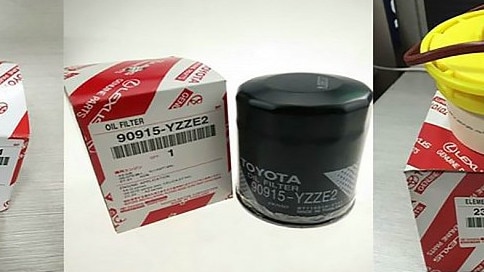
In Australia the sale of car components is governed by national and state rules, including Australian Design Rules (ADRs), customs import restriction and safety standards are enforced by the Department of Infrastructure and, in some cases, the ACCC.
A spokesperson for the ACCC told News Corp Australia that overseas sellers targeting Aussies online must comply with Australian Consumer Law.
That means parts must be fit for purpose, safe, durable, and free from defects.
“Under the ACL consumers receive automatic rights, called consumer guarantees, when they purchase goods or services,” a ACCC spokesperson said.
“If a business fails to meet these guarantees, consumers have a right to a remedy. The remedy businesses should provide will depend on the circumstances, but can include a refund, a repair or replacement.”
“If a business finds that a product they supply is unsafe, we expect it to follow our guidelines and initiate a recall voluntarily to remove it from the market.”
ACCC noted that the The Department of Infrastructure, Transport, Regional Development, Communications and the Arts is responsible for regulating the safety of new road vehicles supplied in Australia, and certain approved road vehicle components.
However, when speaking with the Department of Infrastructure it says it’s only responsible for the first import and sale of vehicles, not what happens after.
“Modifications and repairs to vehicles after first provision are not regulated under the Road Vehicle Standards Act 2018, they fall under the jurisdiction of the state or territory regulators,” a Department of Transport spokesperson said.
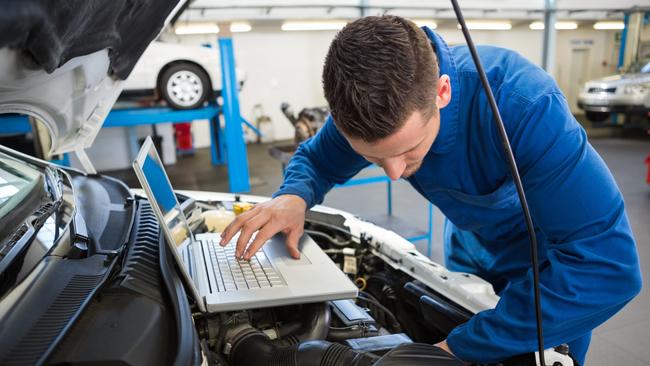
In Victoria, the Department of Transport and Planning said responsibility lies with drivers and repairers.
“All vehicles travelling on Victoria’s roads must comply with standards for registration - and continue to do so after repairs are undertaken,” a Department of Transport spokesperson said.
“It is the responsibility of all drivers to ensure their vehicle is roadworthy at all times to keep themselves and other road users safe.”
The department confirmed that replacement or aftermarket parts need to meet relevant standards, and must be installed in a way that does not affect compliance with Australian Design Rules (ADRs).
Failure to do so could result in an unsafe vehicle or illegal and potentially void insurance.
In NSW, Transport NSW said all aftermarket parts must meet “base Australian Standards” but quickly passed the query to NSW Fair Trading.
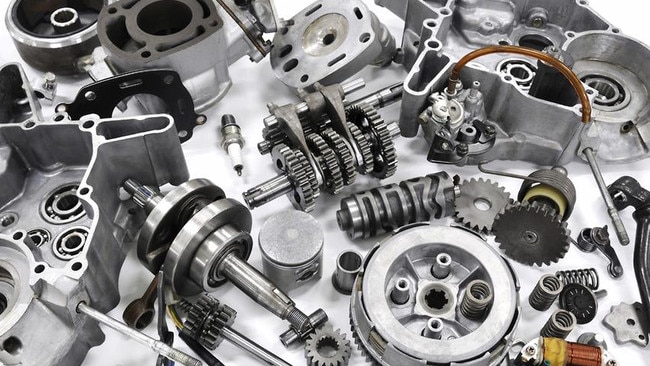
NSW Fair Trading said it does not regulate parts and only oversees mechanic licensing.
“We do not regulate parts, nor do we play any role in safety inspections other than the regulation of the licence of the mechanic,” a NSW Fair Trading spokesperson said.
However NSW Fair Trading encourages consumers to be cautious when buying parts.
“Consumers are encouraged to buy genuine parts if possible or purchase from reputable aftermarket retailers to ensure the parts are of appropriate quality, safety, fit for purpose, and fitted by a licensed vehicle repairer.” a NSW Fair Trade spokesperson said.
“Customers should research traders who offer discounts on parts by checking online reviews and be wary of suppliers offering goods at discount prices.”
But concerns around counterfeit car products are not new.
In 2016, the FCAI revealed that Chinese authorities had seized more than 33,000 counterfeit Toyota and Lexus parts, including airbags, brake components, cables, filters and seals.
The parts were packaged in fake Toyota and Lexus boxes, and were intended for Australia.
In response, the FCAI launched the ‘Genuine is Best’ campaign, which warned of the growing risk posed by imported counterfeit components.
EXPERTS CALL FOR ACTION
Australasian College of Road Safety (ACRS) chief executive officer Ingrid Johnston expressed concern and agreed that there needs to be stronger oversight.
“Anything that is substandard and impacts safety outcomes is a concern to the road safety community,” she said.
It’s not the first time Temu’s operations have come under scrutiny.
Last year in Australia, consumer advocacy group CHOICE conducted an investigation in May 2024, purchasing 15 random coin and button battery-operated products from Temu.
Alarmingly, every product tested failed at least one requirement for mandatory Australian button battery regulations.
In October 2024, CHOICE released a list of 15 Temu products that failed to meet Australian safety standards.
But despite failing to meet Australian standards, the products remained available for purchase.
Internationally, in October 2024, the European Commission launched a formal investigation into the platform under the Digital Service Act (DSA).
This probe was initiated due to suspicions that Temu was failing to prevent the sale of illegal products, including counterfeit items, pharmaceuticals, cosmetics and toys.
The complaint also outlined the use of “dark patterns” and addictive design features.
While the EU investigation placed Temu under scrutiny, in Australia experts are warning that substandard or counterfeit car parts could have life-threatening consequences, not just for drivers but for everyone on the road.
So the question remains: how are potentially dangerous counterfeit car parts still being sold so easily to Australians through platforms like Temu?
Australians are advised to avoid purchasing from unofficial websites or sources and to scrutinise products bought overseas to prevent bringing fake goods into the country.
Consumers can report an unsafe product to the supplier directly and to the ACCC via the ACCC website.
Temu has been contacted for comment.

Add your comment to this story
To join the conversation, please log in. Don't have an account? Register
Join the conversation, you are commenting as Logout
Chaos on highway after 10-vehicle pileup
Traffic is being diverted after a multi-vehicle crash on a major motorway, leaving a truck driver trapped inside the vehicle.
Bad news for electric vehicles in Australia
Tesla is facing mounting pressure in Australia from a wave of Chinese EVs, but new data suggests the entire industry is on the ropes.